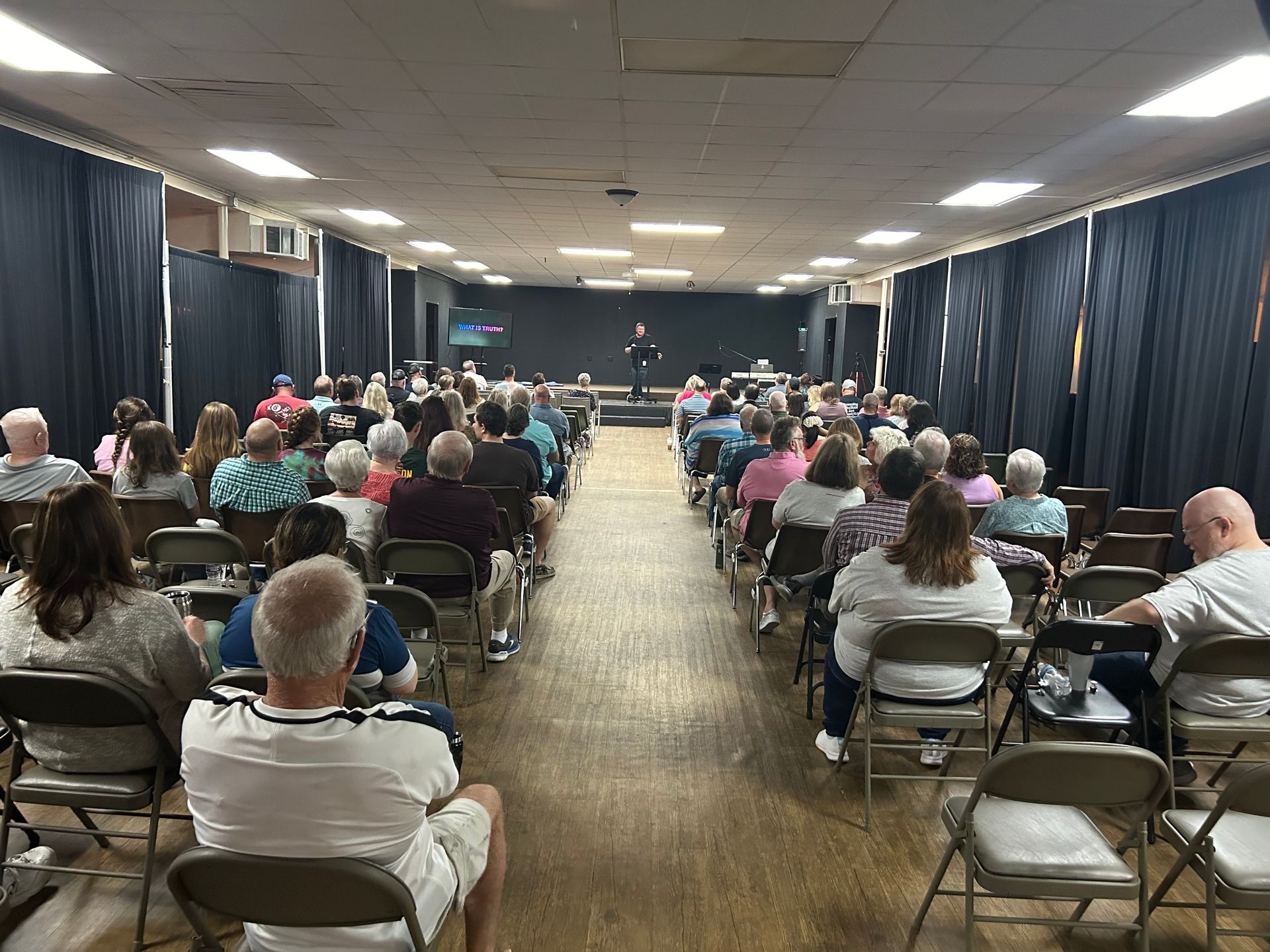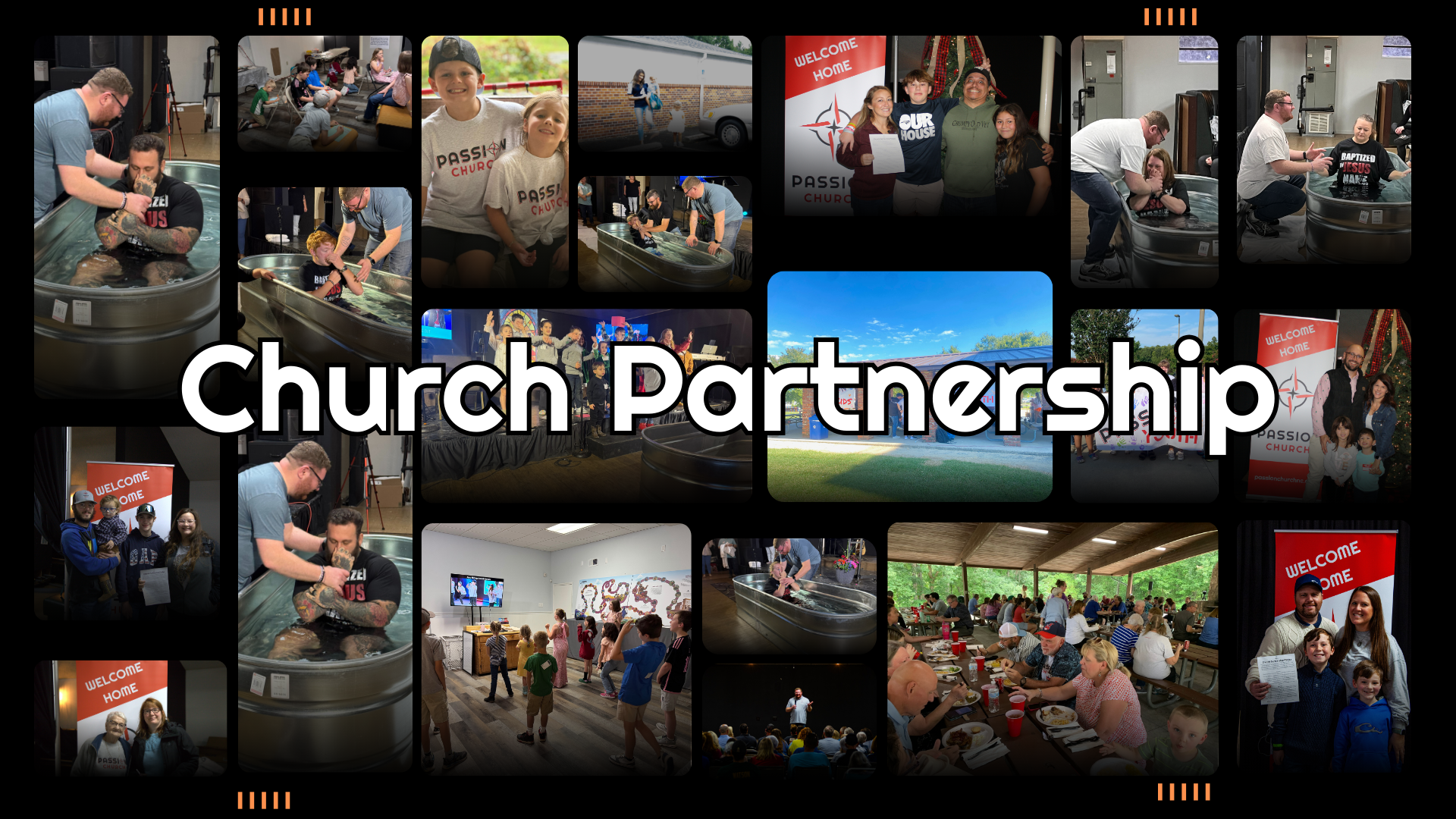September 1, 2025
Sunday Service Times in Kernersville: What to Expect at Passion Church
Joshua Tufte

Sunday Service Times in Kernersville: What to Expect at Passion Church
If you’re searching for a church near me in Kernersville or looking for a welcoming, Bible-based community for your family, Passion Church is here for you. Whether you’re brand new to faith or have followed Jesus for years, we want Sundays to be the best day of your week.
When We Meet
We gather every Sunday at two service times designed to fit your schedule:
9:30 AM & 11:00 AM
Each service lasts about 60-75 minutes and includes modern worship, practical Bible teaching, and ministry opportunities for every age group.
Come Early for Coffee, Snacks, and Community
We encourage you to arrive a little early! Every Sunday, we provide coffee and light snacks so you can relax, meet new people, and build friendships. At Passion Church, we believe church isn’t just about attending a service—it’s about belonging to a family.
Kids Church – Growing in God’s Word
We believe kids aren’t just the church of tomorrow—they’re the church of today. That’s why Kids Church happens during both services, designed for infants through 5th grade.
Engaging worship and Bible lessons taught on their level
A curriculum that takes kids through the entire Bible every three years, giving them a big-picture view of God’s story
Fun activities in a safe, caring environment led by trained volunteers
Safe and Secure Kids Check-In
The safety of every child matters deeply to us. That’s why our kids’ check-in system gives each child and parent a unique matching name tag every Sunday. Parents keep their tag and must show it when picking up their child, ensuring your child is always released safely and securely.
A Safe Place for Your Family
Passion Church is committed to providing a safe environment for everyone who walks through our doors. Each Sunday, our robust safety team is on site, alongside a uniformed police officer, to ensure the protection of our children, families, and guests. You can worship with peace of mind knowing your loved ones are cared for.
Youth Small Group – Bible Study & Discussion
Middle and high school students have a special opportunity during the 11:00 AM service. While adults are in the main worship service, teens gather for a youth small group Bible study and discussion.
Real conversations about faith and life
Guided Bible study that helps students apply God’s Word
A safe space to ask questions and build friendships
What to Wear
One of the questions people often ask before visiting a new church is, “What should I wear?” At Passion Church, the answer is simple: come as you are.
Most of our church family dresses casually—jeans, t-shirts, or whatever makes you comfortable.
You’ll also see some people dressed in full suits and others in shorts and flip flops.
Our pastor, Josh Tufte, typically preaches in jeans and a t-shirt.
We care far more about you than what you wear. So whether you’re dressed up or dressed down, you’ll fit right in.
What to Expect on Sundays
From the moment you arrive, you’ll be greeted by friendly volunteers who are ready to make you feel at home. Here’s what a typical Sunday looks like:
Welcoming atmosphere – Coffee, snacks, and people eager to connect.
Passionate worship – Our band leads with modern, Christ-centered music.
Relevant teaching – Pastor Josh preaches directly from the Bible in a way that applies to everyday life.
Community – Opportunities to connect, serve, and grow are available every week.
Why People Choose Passion Church in Kernersville
There are many Kernersville churches, but people choose Passion Church because:
We’re committed to preaching and teaching God’s Word.
We’re a community of authentic people striving to follow Jesus.
We provide ministries for the whole family—kids, teens, and adults.
We prioritize safety so you can focus on worship without worry.
We believe the church should be filled with hope, joy, and real relationships.
More Than Welcome — You’re Wanted Here
Some people and places may say they want to meet you, that they wish you would come, but when you do, they don’t go out of their way to make you feel at home. At Passion Church, it’s different. You’re not only welcome here, you’re wanted here.
We love growing, meeting new people, serving alongside others, adding new small groups, and seeing new faces every Sunday. More than anything, we genuinely love people and want anyone who is interested to join us as we follow after Jesus Christ.
Join Us This Sunday
If you’re looking for a Kernersville church that’s passionate about Jesus, welcoming to families, committed to God’s Word, and intentional about creating a safe, joyful environment, we’d love to meet you this Sunday.
📍 Passion Church – 612 Edgewood St. Kernersville, 27284 NC
🕘 Service Times – Sundays at 9:30 AM & 11:00 AM
Come early, grab some coffee, connect with others, and experience a church where you truly belong.
share this
Related Articles
Related Articles

Grace and Truth… which one actually matters more? I think this question might be at the root of a lot of the tension and disunity we’re seeing among Christians right now—especially in how we respond to the culture around us. And I think some of it comes down to misunderstanding how grace and truth are supposed to work together. Hear me out. All throughout Scripture, we see two big themes in how God interacts with people: grace and truth. Even in the garden, this shows up. It was pure grace that God created us in His image and wanted a relationship with us. But there was also truth—His law. And when that law was broken, separation followed. Grace and truth, together. When Jesus shows up, He doesn’t throw out the law. He fulfills it. He teaches Scripture with wisdom that leaves people stunned. And yet… He eats with sinners. He walks patiently with imperfect disciples. He washes the feet of the man who would betray Him. That tension is everywhere. Grace and truth. Fast forward to today, and it feels like we keep picking one side or the other. Some people go all in on truth. Call everything out. Shout it down. Cancel it. If culture violates God’s design, it needs to be exposed loudly and publicly. Truth matters, period. Others swing the opposite way. “Just love people.” “Don’t worry about sin.” “Jesus forgives, so none of this really matters.” Grace becomes the whole message. The problem is… both of those miss something important. Truth by itself doesn’t save people who don’t believe. Scripture even warns us about this. Jesus talks about not throwing pearls before pigs—not as an insult, but as a way of saying you can’t expect people who don’t share your worldview to value Scripture the way you do. Why are we surprised when sinners act like sinners? Truth is mainly for the family of God. We hold Christians accountable to live like Christians. When we try to force biblical standards on people who don’t believe, it usually just pushes them further away. But grace without truth isn’t love either. Jesus didn’t come with one or the other. He came full of both. As Craig Groeschel puts it: “Truth without grace leads to hell. Grace without truth doesn’t exist.” If we judge anyone—including ourselves—by the law alone, we’re all done. Romans makes that pretty clear. None of us measure up. Not one. At the same time, agreeing with everything someone does just to keep the peace isn’t loving. If my one-year-old reaches for a hot stove, I don’t say, “Go for it, that’s your truth.” I stop her and tell her the truth—because I love her. So maybe the better question is: what if we started with grace? What if we led with love, patience, and relationship—and then spoke truth inside that relationship? Not as a weapon, but because we actually care. And if someone still chooses a path we believe is harmful, we don’t abandon them. We keep loving them. Because grace saves. Our fight isn’t against people. Scripture says it’s against unseen forces. And yet we often end up hating the very people we’re called to reach—over politics, music, or a halftime show no one will remember in a year. Is that really worth losing the chance to share the gospel? Nothing is worth souls. Jesus told us to go and make disciples, not win arguments. The people who vote differently, live differently, love differently, or believe differently are still God’s children. Yes, truth matters—but grace has to lead. Grace and truth. Not one. Both. So what does this look like in real life? It looks like this: we keep loving them. We keep praying for them. We keep showing up. We keep building the relationship. And we keep gently, faithfully leading them toward Christ—slowly, lovingly, with grace and truth working together. Jesus was perfect—the most right person to ever walk the earth. And yet sinners didn’t run from Him. They flocked to Him. Why? Because He embodied the perfect balance of grace and truth. He didn’t water down truth, and He didn’t weaponize it either. He showed us the mark to aim for. Living that way is hard. It will draw fire from both sides. You’ll be “too soft” for some and “too rigid” for others. But it’s worth it. I’ve had the privilege of walking with people who came from very dark places and watching them find salvation in Jesus Christ—seeing lives saved, changed, healed, and restored. There is nothing like it. And that only happens when we love people long enough, patiently enough, and faithfully enough to walk with them toward truth instead of trying to shout them into it. So I’d genuinely love to hear your thoughts. Where do we draw lines? How do we actually live this out day to day? Do you even agree with this? Please be kind to one another. We’re here to talk, learn, and sharpen—not fight.

Passion Family, Over the last few weeks in The Playbook series, we haven’t just been talking about vision — we’ve been talking about formation . About who God is shaping us to be as His people in this season. At Passion Church, we believe the Kingdom of God moves forward through partnership, not pressure. Through people who say, “God, You can count on me.” That’s why we’re stepping into Commitment Sunday and a Month of Partnership together. Below you’ll find links to our website with more information about Commitment Sunday, what it means to partner with Passion Church, how to get involved, and a deeper look at Project OIKOS. Please take time to read through this and follow the links. We are prayerfully inviting our church family to seek what God is calling them to do. Our next steps are significant, and this is where you can begin partnering with us. What does it mean to partner with Passion Church? On Commitment Sunday, we’re inviting our church family to prayerfully step into four commitments — not as boxes to check, but as a way of life: GROW Choosing to go deeper in your walk with Jesus — being rooted in Him, authentic before Him, and intentional about spiritual growth. SERVE Using your gifts to love people well — stepping into compassion, meeting real needs, and helping carry the mission of the church forward. GIVE Living generously — not out of guilt or obligation, but as an act of worship and a reflection of God’s heart in a broken and divided world. ATTEND Showing up consistently — building your life around worship, community, and the work God is doing through this house. This isn’t about perfection. It’s about faithfulness . It’s about alignment. It’s about saying yes to what God is doing here. A Word to Those Already Partnered With Passion Church If you are already partnered with Passion Church, I want to say thank you . Your faithfulness, generosity, and willingness to show up have helped shape this church into what it is today. Because of your commitment, lives are being changed and the Kingdom of God is moving forward through this house. During this season, we’re inviting our existing partners to renew their partnerships —not because anything was lacking, but because God is leading us into a new chapter. Renewal is a way of saying, “God, I’m still in. I’m still aligned. And I’m ready for what You’re doing next.” This season is an opportunity to recommit with fresh faith, fresh vision, and a renewed sense of purpose as we move boldly into the future together. Commitment Sunday & the Month of Partnership Commitment Sunday is the starting point — and our largest moment — where we commit together as a church family. Through this Sunday, it will not only unite us in purpose but also allow leadership, myself, staff members, the advisors, and our external oversight team (Elders) to gauge where we are in the process of launching our new campus, both with volunteers and finances. It launches a full Month of Partnership throughout February, giving everyone the opportunity to take their next step in partnership with Passion Church. Beginning February 1 and continuing through the end of the month : Partnership and commitment forms will be available at the Connection Desk each Sunday Online commitment forms will remain open on our website Upfront gifts for Project OIKOS can be given at any time Long-term giving commitments can be submitted throughout the month While Commitment Sunday is our primary push — the moment we believe God will unite us most powerfully — we also want to create space for those who are traveling, sick, new to Passion Church, or simply need more time to pray. Our prayer is that this month will align our hearts, unify our faith, and allow us to move boldly into our next season together . Learn More About Partnership Here Project OIKOS Out of this posture of partnership, we are stepping into Project OIKOS. OIKOS is a biblical word meaning household, family, and those entrusted to our care. Project OIKOS is about building a spiritual home — a place where people can belong, grow, heal, and encounter Jesus for generations to come. Our overall goal is to raise $285,000 over the next 24 months . As part of that, we are prayerfully asking God to provide $120,000 in upfront gifts by the end of April , leaving $165,000 to be fulfilled through long-term giving commitments over the remaining 24 months. I want to say this clearly and pastorally: Project OIKOS is not about money first. It’s about mission. It’s about stewardship. It’s about obedience. Giving is simply one way we participate in what God is doing — alongside growing, serving, and showing up. Learn More About Project OIKOS Here How to Make a Commitment If you’re able to be with us in person on Commitment Sunday, we would love for you to participate together as a church family. If you can’t be there in person, you can still partner with us. Our Commitment Sunday page on the website will be live starting today, and you’ll be able to submit your commitment online. Additionally, commitment cards will be available at the Connection Desk throughout February for anyone who wants to commit in person after Commitment Sunday. Throughout this series, we’ve been reminded that: God is generous, and He forms generous people The world is divided, and the Church must look different Love becomes visible through sacrifice When God’s people commit together, God moves powerfully So here’s my pastoral invitation to you: Pray. Seek the Lord. Talk as a family. Ask not, “What’s expected?” but “What is God inviting us into?” And whether you are partnering for the first time or renewing your partnership , this Month of Partnership is your opportunity to say yes. We are not trying to build something flashy or glamorous. We are building something faithful. Something rooted. Something that will impact lives for generations. I am honored to walk into this next season with you. With gratitude and excitement, Pastor Josh Passion Church

Before we talk about who God is, I want to invite you to pause and open your heart. We all bring something into conversations about God: • childhood experiences • past church wounds • cultural assumptions • religious confusion • parental mistreatment • or even silence about God For many, the very word “God” carries layers of misunderstanding. So as we explore this doctrine, I’m asking you to do three things: 1. Lay down past assumptions. Not every idea you were taught about God was accurate. 2. Allow Scripture to speak clearly. We are approaching this biblically—not through wounds, fears, or culture. 3. Give grace to your own story and the stories of others. Many people struggle with their view of God. You’re not alone. My goal is not to overwhelm you with theology. My goal is to help you see God clearly, love Him deeply, and trust Him fully. Now, let’s walk together through who God reveals Himself to be. ________________________________________ 1. God Is Creator — The Beginning of Everything Begins With Him The Bible opens with a bold, simple declaration: “In the beginning, God created the heavens and the earth.” — Genesis 1:1 And honestly, I find it a little humorous how people often present the two major views of how everything began. On one hand, you have the Big Bang: An invisible, unexplainable force that made something out of nothing. On the other hand, you have God: An invisible, eternal Being who made something out of nothing. When you put them side by side, it’s almost funny. In both cases, a cause outside the visible universe sparks life into existence. Both require faith. Both ask us to believe in something we can’t physically observe. The real question isn’t whether an invisible cause started everything. The real question is Who or what that cause is. Some say the universe exploded into existence with no personal intent or meaning. Christians believe the universe was spoken into existence by a personal God filled with purpose, creativity, and love. And here’s the irony: Even the Big Bang—a sudden burst of light and energy—sounds very similar to “Let there be light.” It just depends on how you view it. Many scientists now affirm the universe had a beginning— that time, space, and matter came into existence suddenly, and that the cause must exist outside of all three. That sounds a whole lot like God. Science often describes how things work. The Bible reveals Who made them work— and why He made them at all. God didn’t create because He needed anything. He created because He is overflowing with love, creativity, and purpose. You are not an accident. You are not random. You were created intentionally by a God who knows you and loves you. ________________________________________ 2. God Is Eternal — Unchanging, Unbound by Time, Always Present Psalm 90:2 says: “From everlasting to everlasting, You are God.” God existed before the universe. He exists beyond time. He does not age, weaken, or evolve. He is not learning or adjusting. He simply is. When Moses asked for His name, God responded: “I AM WHO I AM.” — Exodus 3:14 Not “I was.” Not “I will be.” Just I AM—constant, faithful, ever-present. This matters because: • Feelings change. • People change. • Circumstances change. • Cultures change. God does not. The God who spoke in Genesis is the same God listening to your prayers today. You can build your life on a God who never shifts. ________________________________________ 3. God Is Father — Loving, Protecting, Guiding, and Caring for His Children When Jesus taught His disciples to pray, He didn’t say: • “Our Judge…” • “Our Creator…” • “Our King…” He said: “Our Father…” — Matthew 6:9 Jesus intentionally revealed the heart of God as a Father— not distant, cold, or harsh, but relational, present, deeply loving. But for many people, the word “father” is complicated. If your earthly father: • abandoned you, • criticized you, • abused you, • ignored you, • or failed to protect you, then seeing God as Father may feel painful or impossible. Here is the truth you need to hear: God is not the reflection of your earthly father. He is the perfection of fatherhood. Scripture reveals that God is a Father who: • Loves His children (1 John 3:1) • Protects them (Psalm 46:1) • Provides for them (Matthew 6:31–32) • Guides them (Psalm 23) • Disciplines them out of love (Heb. 12:6) • Delights in them (Zeph. 3:17) He is the Father who runs to the prodigal, not away. The Father who carries His children when they are weak. The Father who fights for His family. The Father who never leaves, never wounds, never abuses, never manipulates. He is the Father your soul was created for. ________________________________________ 4. God Is Triune — One God in Three Persons We believe in one God who exists eternally as: • Father • Son • Holy Spirit Not three gods. Not one God wearing three masks. Not one God shifting between roles. One Being. Three Persons. Perfect unity. Why does this matter? 1. God has always been relational. Love existed before creation within the Trinity. 2. God models unity and partnership. The Father plans, the Son accomplishes, the Spirit empowers. 3. The Trinity reveals the depth of God’s love. The Father sends. The Son sacrifices. The Spirit transforms. The Trinity isn’t a puzzle. It’s a beautiful mystery that shows us God’s relational, united, and loving heart. ________________________________________ 5. God Is Sovereign — Fully in Control, Completely Good Sovereignty does not mean: • God forces human choices • God removes free will • God causes evil • God micromanages every detail Sovereignty means: • God’s authority is absolute • God’s plans are unstoppable • God is never surprised • God is never defeated • God works all things for the good of His people God’s sovereignty isn’t about control— it’s about trustworthiness. He is powerful enough to rule creation and tender enough to walk with you through pain. ________________________________________ 6. God Is the Giver of Free Will — The Gift That Makes Love Possible Free will is one of God’s greatest gifts—second only to grace. Why? Because love cannot exist without choice. If God forced obedience, forced worship, forced devotion— it wouldn’t be love. So God gave humanity the ability to: • obey or disobey, • pursue Him or reject Him, • choose good or choose evil, • forgive or stay bitter, • love or hurt, • move toward God or away from Him. This gift is beautiful… and dangerous. It is the foundation for: • every act of kindness • every act of evil • every moment of worship • every moment of rebellion Free will explains why beauty exists and why brokenness exists. You are not a robot. You are a person God loves— a person capable of choosing Him freely. God’s sovereignty and human free will do not compete. They work in perfect tension. God’s will is ultimate. Your choices are meaningful. Together, they shape your life and your relationship with God. ________________________________________ 7. God Is Good — Perfect in Character, Perfect in Love Everything God does flows from His goodness. He cannot: • lie • manipulate • harm • betray • act out of evil He is holy, just, patient, merciful, gracious, and loving. If anything in your life contradicts His goodness, it did not come from Him. ________________________________________ 8. Why Understanding God Matters for Everyday Life If God is Creator — your life has purpose. If God is Father — you are loved and safe. If God is Eternal — He is your anchor. If God is Triune — you were designed for community. If God is Sovereign — you can trust Him. If God gives free will — your choices matter. If God is good — you can run to Him, not from Him. Your entire worldview rises or falls on who you believe God is. ________________________________________ 9. Don’t Just Take My Word for It — Explore Him Yourself Read these Scriptures this week: • Genesis 1 • Psalm 23 • Psalm 90 • Matthew 6 • Luke 15 • John 14–17 • Romans 8 • 1 John 3–4 Ask God to reveal Himself to you as: • Creator • Father • Sovereign • Good • Present Don’t quit when Scripture stretches you. Lean in. Ask questions. Search. God loves revealing Himself to those who seek Him. ________________________________________ 10. Final Thought: The Way You See God Shapes the Way You Live If you believe God is distant, you will feel alone. If you believe He is harsh, you will hide. If you believe He is controlling, you will resist. If you believe He is passive, you will feel abandoned. But if you believe He is: • Creator • Eternal • Triune • Father • Sovereign • Good • Loving • Wise • Present …then everything about your life changes. Your identity changes. Your peace changes. Your purpose changes. Your relationships change. Your decisions change. Your worship changes. Who God is determines who you become. Anchor your life to the God who created you, loves you, redeemed you, empowers you, guides you, and walks with you every step of the way.





